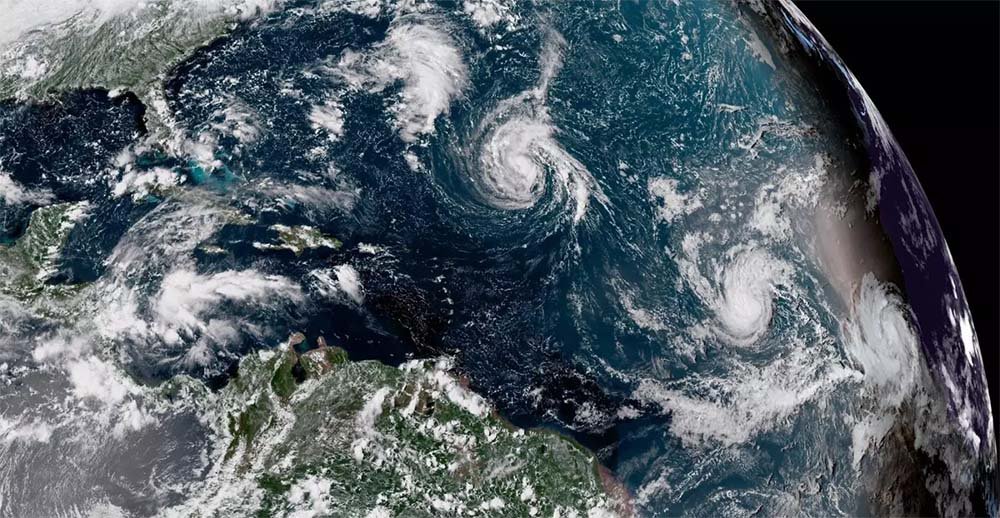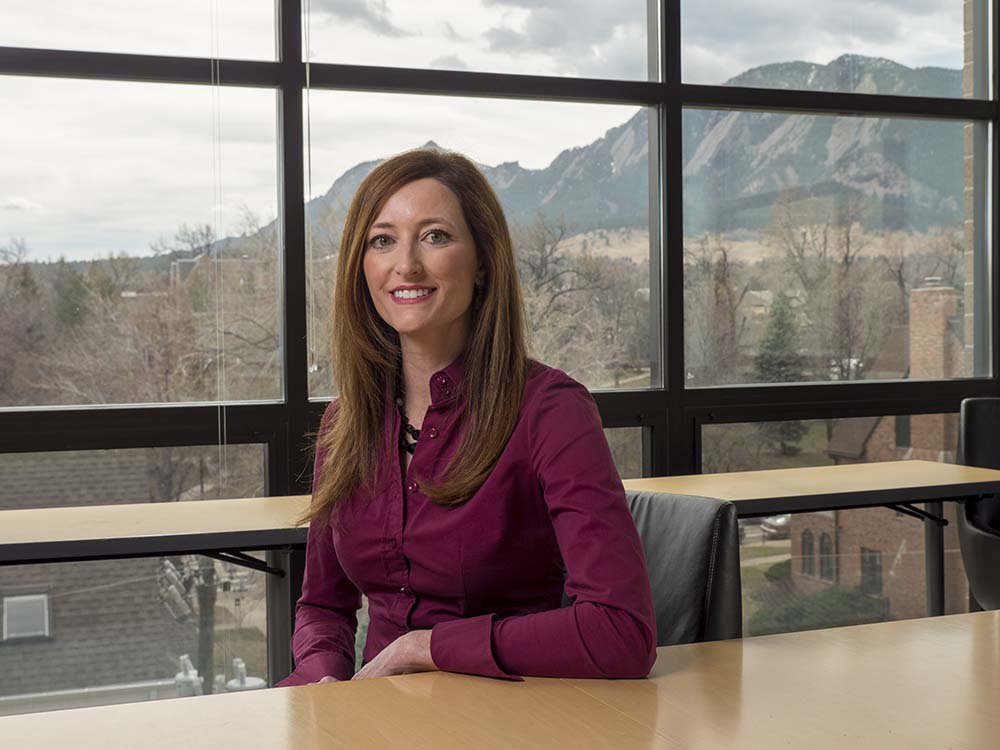FOR IMMEDIATE RELEASE:
NSF creates $3M CONVERGE center to augment natural hazards research
 Image coutesy of National Oceanic and Atmospheric Administration/Department of Commerce (NOAA).
Image coutesy of National Oceanic and Atmospheric Administration/Department of Commerce (NOAA).
BOULDER, Colo., Nov. 14, 2018 To enhance the diversity of research underway in natural hazards, the National Science Foundation recently created CONVERGE, a $3 million research center at the University of Colorado Boulder. The center is a resource for the 11-member, NSF-funded Natural Hazards Engineering Research Infrastructure, known as NHERI.
One of the NSF 10 Big Ideas, convergence describes the merging of scientific disciplines in a coordinated, reciprocal way that fosters the robust collaborations needed for successful inquiry. For NSF, convergence research is driven by a compelling problem that can be solved by deep integration between disciplines.
The CONVERGE facility will build and support the research partnerships and creative thinking needed to address complex problems that are posed by natural hazards, unsustainable development, and rising economic inequality.
As a resource, CONVERGE catalyzes the efforts of the NHERI users through coordination of the various reconnaissance groups organized by the community with the support of NSF, said Julio Ramirez, director of the NHERI Network Coordination Office and the Karl H. Kettelhut Professor in Civil Engineering at Purdue University.
Augmenting NSF Support of Natural Hazards Research
Lori Peek, professor of sociology and director of the Natural Hazards Center at UCB, is the principal investigator for CONVERGE. She said the facility is aligned with NSFs goals for research convergence, as well as with NHERIs mission to improve the resiliency of the nations civil infrastructure to withstand natural hazards.

Lori Peek, Principal Investigator, CONVERGE
The center is dedicated to bringing together engineering, social sciences, and interdisciplinary teams to reduce hazards losses and improve social wellbeing. Peek said the goal of risk reduction and enhanced resilience is central to the NHERI mission, and the CONVERGE center will help advance that through its focus on research collaboration and coordination.
Convergence science is about bringing together diverse people, perspectives, and skillsets to solve the worlds toughest challenges, Peek said. CONVERGE will allow us to link various research communities, to develop and share best practices for the ethical conduct of research, and to promote social science, engineering, and interdisciplinary natural hazards research to reduce vulnerability.
Broad Goals
The CONVERGE center functions as a resource for the broader social science and engineering communities. We are engaging in several crucial tasks that are meant to advance the broader research enterprise, Peek explained. These tasks include:
- Creating the first ever reconnaissance Leadership Corps, including the leaders of the geotechnical, social science, and structural engineering extreme events reconnaissance (EER) networks and associated NHERI facilities. The Leadership Corps will develop community-driven best practice guidance for reconnaissance researchers and research teams and will help to establish effective communications protocols with the media and with local, state, and federal government officials in the event of a major disaster.
- Identifying, connecting, and coordinating social science researchers and interdisciplinary research teams through the Social Science Extreme Events Research (SSEER) and Interdisciplinary Science and Engineering Extreme Events Research (ISEEER) networks.
- Developing a series of training modules and research briefing sheets for students and researchers who are new to the hazards and disaster research space.
- Funding social science and interdisciplinary quick response research teams with a special emphasis on democratizing the research process and engaging researchers from historically underrepresented groups.
- Collaborating with the NHERI DesignSafe Cyberinfrastructure, located at the University of Texas-Austin, to develop a novel natural hazards and disaster focused social science data model for curating, publishing, and sharing of open data. This will serve as a central repository for social science research instruments, data collection and sampling protocols, and datasets.
- Collaborating with NHERI RAPID facility, based at the University of Washington, to advance social science and interdisciplinary mobile applications for research.
- Collaborating with the NHERI Network Coordination Office, located at Purdue University, to help develop the next generation of researchers and scientists focused on mitigating the exposure of civil infrastructure to natural hazards and to disseminate the impact of the efforts of current and future NHERI users.
Connecting Social Scientists and Engineers
Social scientists have a long history of conducting hazards mitigation and post-disaster research with individuals, households, organizations, and entire communities. Such research has led to fundamental breakthroughs that have helped advance policy and emergency management practice and have ultimately saved lives.
As a social scientist, Peek has collaborated with engineers throughout her career. For instance, she recently finished working with a large interdisciplinary team to develop natural hazards school safety guidance for the nation.
That project would not have been possible without collaborations across disciplines, she said. Engineers taught our team how to ensure that the school facilities that children attend are safe, while social scientists contributed knowledge regarding the social differences across schools that may encourage or impair the adoption of recommended protective actions.
In an era marked by climate change and rising social and economic inequality, disasters are becoming more intense and severe. My vision for CONVERGE is for us to come together as social scientists and engineers to see how we can turn the tide and reduce the harm and suffering from these extreme events, Peek said.
Shortly, CONVERGE will release the Social Science Extreme Events (SSEER) map and a series of quick response research briefing sheets. Currently, the team is conducting the first ever census of social science hazards and disaster researchers. Find out more about these efforts here.
The Team
CONVERGE is located at the Natural Hazards Center at the University of Colorado Boulder, one of the nations oldest social science and multidisciplinary academic hazards research centers. Members of the Natural Hazards Center team are helping get CONVERGE off the ground. Moving forward, the center will hire two postdoctoral scholars and identify members for various advisory committees.
CONVERGE also involves collaborations with the Center for Environmental Journalism at the University of Colorado Boulder. In addition, the CONVERGE team will partner with the Bill Anderson Fund and the NSF-funded Minority SURGE program to ensure that emerging scholars from historically underrepresented groups are engaged in future reconnaissance efforts.
Media Contact
CONVERGE
Lori Peek, Principal Investigator, CONVERGE
Professor of Sociology and Director of the Natural Hazards Center, University of Colorado Boulder
lori.peek@colorado.edu
NHERI
Julio Ramirez, Director, NHERI Network Coordination Office
Karl H. Kettelhut Professor in Civil Engineering at Purdue University
ramirez@purdue.edu
NSF
Sarah Bates, NSF Public Affairs Specialist
703-292-7738
sabates@nsf.gov





